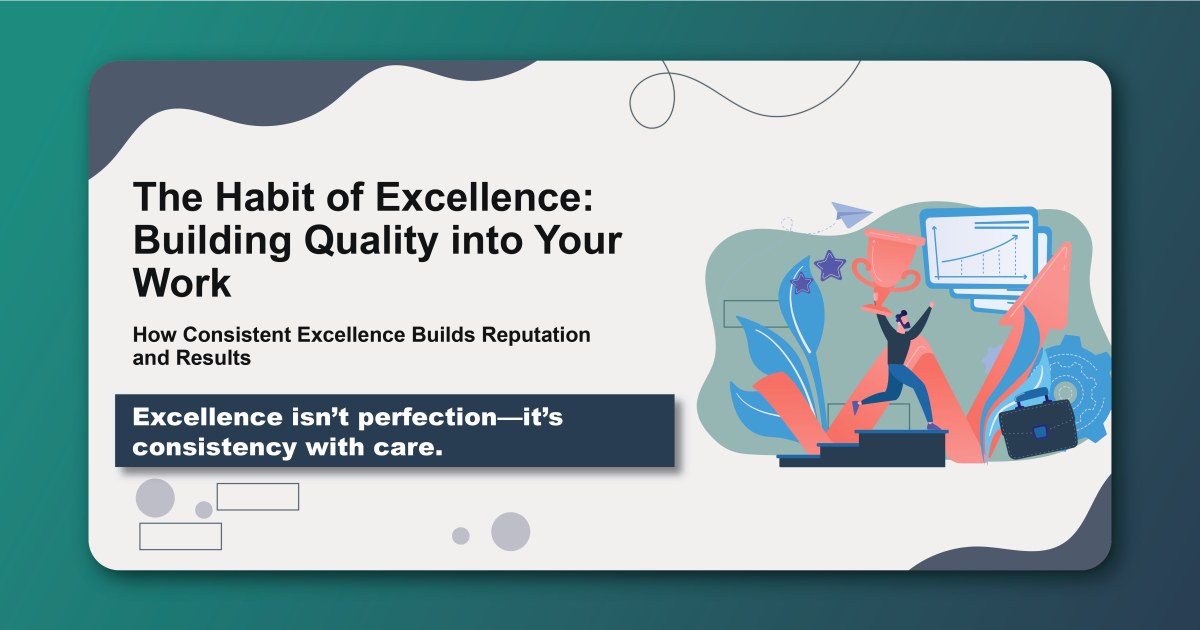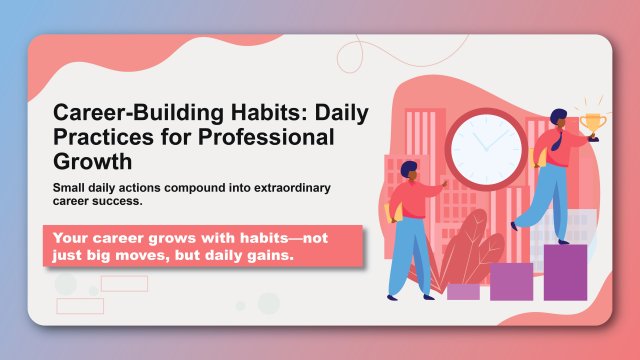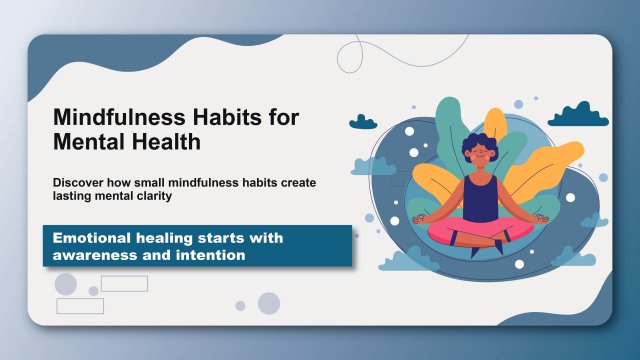Excellence is not an accident, nor is it achieved through occasional bursts of exceptional effort. True excellence is the result of consistent daily habits that build quality into every aspect of your work. While many professionals focus on completing tasks and meeting deadlines, those who achieve lasting career success understand that the quality of their work is what sets them apart and creates opportunities for advancement, recognition, and professional fulfillment.
The habit of excellence goes beyond simply doing good work—it's about developing standards and practices that consistently produce exceptional results. It's about caring about the details that others might overlook, taking pride in your contributions, and understanding that excellence is not a destination but a way of operating. Excellence becomes a habit when the pursuit of quality becomes automatic, woven into your daily routines and decision-making processes.
What distinguishes excellent performers from merely competent ones is not necessarily greater talent or intelligence, but rather the daily habits that ensure quality is built into every piece of work they produce. These habits include attention to detail, thorough preparation, continuous improvement, and a commitment to standards that exceed minimum requirements. They understand that reputation is built one project at a time, one interaction at a time, and one decision at a time.
The modern workplace rewards excellence more than ever before. In an age of information overload and constant distractions, work that demonstrates exceptional quality, thoughtfulness, and attention to detail stands out dramatically. Excellence becomes a competitive advantage that opens doors, creates opportunities, and builds a professional reputation that generates its own momentum for career advancement.
Building excellence into your work habits requires intentional practice and a shift in mindset from "good enough" to "how can this be exceptional?" It means developing systems and practices that consistently produce high-quality results, even when under pressure or facing tight deadlines. Most importantly, it means understanding that excellence is not about perfection—it's about consistent commitment to quality and continuous improvement.
This comprehensive guide explores the daily habits that transform the pursuit of excellence from an occasional goal into a consistent practice that defines your professional identity and drives your career success.
The Foundation of Excellence
Understanding Professional Excellence
Quality as a Differentiator In competitive professional environments, quality work becomes the primary differentiator between average and exceptional performers.
Excellence vs. Perfection Excellence is about consistently high standards and continuous improvement, while perfection is an impossible standard that can paralyze progress.
Compound Effect of Quality Each piece of excellent work builds upon previous efforts, creating a reputation and standard that becomes increasingly difficult to maintain but increasingly valuable.
Personal Brand Through Excellence Excellence in work becomes your personal brand, creating a reputation that precedes you and opens new opportunities.
Excellence Mindset Principles
Standards Above Requirements Excellence means consistently exceeding minimum requirements and basic expectations.
Attention to Detail Excellence is often found in the details that others overlook or consider unimportant.
Continuous Improvement Excellence requires constantly seeking ways to improve processes, outcomes, and quality.
Ownership and Accountability Excellence means taking complete ownership of your work and its impact on others.
Daily Quality Habits
Work Preparation and Planning
Thorough Preparation Invest time in understanding requirements, context, and expectations before beginning any work.
Preparation Practices:
- Research background information and context thoroughly
- Understand stakeholder needs and expectations
- Identify potential challenges and develop mitigation strategies
- Gather all necessary resources and tools
- Create detailed project plans and timelines
Quality Planning Build quality checkpoints and review processes into your work from the beginning.
Quality Planning Elements:
- Define clear quality standards and success criteria
- Build in time for review and revision
- Plan for multiple drafts and iterations
- Schedule feedback sessions with stakeholders
- Create quality checklists and validation processes
Resource Allocation Allocate sufficient time and resources to produce excellent work rather than rushing to meet deadlines.
Resource Strategies:
- Estimate time requirements realistically
- Build buffer time for unexpected challenges
- Allocate the best tools and resources available
- Seek help and expertise when needed
- Prioritize important work to ensure adequate attention
Execution Excellence Habits
Attention to Detail Develop systems and practices that ensure consistency and accuracy in all work.
Detail-Oriented Practices:
- Create checklists for complex processes
- Use systematic review processes
- Double-check calculations and data
- Verify information and sources
- Proofread and edit all written work
Iterative Improvement Approach work as an iterative process with multiple rounds of refinement.
Improvement Approaches:
- Plan for multiple drafts and revisions
- Seek feedback early and often
- Test and validate approaches before final implementation
- Refine based on feedback and results
- Document lessons learned for future application
Stakeholder Focus Consider the end user or stakeholder in every decision and aspect of your work.
Stakeholder Considerations:
- Understand the perspective of those who will use your work
- Anticipate questions and concerns
- Design solutions that are user-friendly and accessible
- Consider the broader impact of your work
- Seek to exceed stakeholder expectations
Quality Control Systems
Self-Review Processes Develop systematic approaches to reviewing and improving your own work.
Self-Review Methods:
- Step away from work before final review
- Review work from the perspective of the end user
- Check against original requirements and objectives
- Verify accuracy of all facts and figures
- Ensure consistency in formatting and presentation
Peer Review Integration Seek feedback from colleagues and peers to identify improvement opportunities.
Peer Review Practices:
- Request feedback from knowledgeable colleagues
- Participate in peer review processes
- Offer to review others' work in return
- Create feedback partnerships with trusted colleagues
- Use peer input to identify blind spots
Continuous Validation Validate your work against external standards and benchmarks.
Validation Strategies:
- Compare your work to industry best practices
- Benchmark against high-quality examples
- Seek validation from subject matter experts
- Use external resources and standards
- Measure results against stated objectives
Professional Standards and Ethics
Integrity in Work
Honest Communication Maintain complete honesty in all professional communications and representations.
Integrity Practices:
- Report accurate information even when inconvenient
- Admit mistakes and take responsibility
- Avoid overselling capabilities or underselling challenges
- Represent others' work and ideas accurately
- Maintain confidentiality and trust
Ethical Excellence Ensure that pursuit of excellence never compromises ethical standards.
Ethical Considerations:
- Consider the broader impact of your work
- Ensure compliance with all relevant regulations and standards
- Respect intellectual property and attribution
- Maintain professional boundaries and relationships
- Balance excellence with ethical responsibilities
Reliability and Consistency
Dependable Performance Build a reputation for consistent, reliable performance across all work.
Reliability Habits:
- Meet all deadlines and commitments
- Maintain consistent quality standards
- Communicate proactively about challenges
- Follow through on all promises and commitments
- Provide consistent value in all interactions
Professional Consistency Maintain the same high standards regardless of the project, audience, or circumstances.
Consistency Strategies:
- Apply the same quality standards to all work
- Maintain professionalism in all interactions
- Use consistent processes and approaches
- Uphold standards even under pressure
- Treat all stakeholders with equal respect and attention
Innovation and Creativity in Excellence
Creative Problem-Solving
Innovative Approaches Seek creative solutions that go beyond conventional approaches.
Innovation Practices:
- Question assumptions and conventional wisdom
- Explore multiple solution approaches
- Combine ideas from different domains
- Experiment with new tools and methods
- Encourage creative thinking and brainstorming
Value Creation Look for ways to add unexpected value to your work and contributions.
Value Creation Strategies:
- Identify opportunities to exceed expectations
- Provide additional insights and analysis
- Create resources that benefit others
- Solve problems that weren't explicitly requested
- Anticipate future needs and address them proactively
Continuous Learning for Excellence
Skill Development Continuously develop skills that enhance your ability to produce excellent work.
Skill Development Areas:
- Technical skills relevant to your field
- Quality management and process improvement
- Communication and presentation skills
- Leadership and collaboration abilities
- Industry knowledge and trends
Best Practice Research Stay current with best practices and innovations in your field.
Research Practices:
- Read industry publications and research
- Attend conferences and professional development events
- Network with other excellent performers
- Study successful case studies and examples
- Experiment with new approaches and technologies
Building a Culture of Excellence
Leading by Example
Excellence Modeling Demonstrate excellence in your own work to inspire others.
Modeling Behaviors:
- Consistently produce high-quality work
- Show attention to detail in all interactions
- Demonstrate commitment to continuous improvement
- Take ownership of mistakes and learning opportunities
- Share knowledge and best practices with others
Standard Setting Help establish and maintain high standards within your team and organization.
Standard Setting Approaches:
- Advocate for quality in team processes
- Volunteer for challenging, high-visibility projects
- Provide constructive feedback that raises standards
- Recognize and celebrate excellence in others
- Create resources and tools that support quality work
Mentoring and Development
Knowledge Sharing Share your expertise and approaches with others to raise overall quality.
Sharing Strategies:
- Mentor junior colleagues and team members
- Document and share best practices
- Teach others your quality processes
- Provide constructive feedback and guidance
- Create training materials and resources
Collaborative Excellence Work with others to achieve excellent results through collaboration.
Collaboration Practices:
- Contribute your best thinking to team efforts
- Support others in achieving their excellence goals
- Share resources and tools that improve quality
- Participate in quality improvement initiatives
- Build relationships that support mutual excellence
Sustaining Excellence Over Time
Preventing Burnout
Sustainable Practices Develop approaches to excellence that can be maintained over time without burnout.
Sustainability Strategies:
- Focus on process improvement rather than just working harder
- Build efficiency into your quality practices
- Take breaks and maintain work-life balance
- Seek support when needed
- Celebrate achievements and progress
Energy Management Manage your energy to maintain high performance over time.
Energy Management Practices:
- Work on challenging tasks when energy is highest
- Take breaks to maintain focus and creativity
- Maintain physical and mental health
- Vary types of work to prevent monotony
- Seek inspiration and motivation regularly
Continuous Improvement
Regular Assessment Regularly evaluate your performance and identify areas for improvement.
Assessment Practices:
- Conduct regular self-assessments
- Seek feedback from supervisors and peers
- Track quality metrics and outcomes
- Analyze successes and failures
- Set improvement goals and action plans
Adaptation and Evolution Adapt your excellence practices as your role and responsibilities evolve.
Evolution Strategies:
- Update quality standards as you gain experience
- Incorporate new tools and methods
- Adjust approaches based on feedback and results
- Expand your definition of excellence
- Seek new challenges that stretch your capabilities
Recognition and Career Impact
Building Professional Reputation
Reputation Development Understand how excellent work builds professional reputation over time.
Reputation Building:
- Consistently deliver exceptional results
- Volunteer for challenging assignments
- Share your expertise and knowledge
- Maintain professional relationships
- Seek opportunities for visibility and recognition
Career Advancement Leverage your reputation for excellence to create career opportunities.
Career Strategies:
- Seek roles that showcase your excellence
- Build relationships with influential stakeholders
- Document and communicate your achievements
- Seek feedback on your professional development
- Pursue opportunities that align with your excellence strengths
Long-term Success
Excellence as Competitive Advantage Understand how the habit of excellence creates lasting competitive advantages.
Competitive Advantages:
- Reputation for quality work
- Trust and credibility with stakeholders
- Opportunities for advancement and growth
- Personal satisfaction and fulfillment
- Influence and impact in your field
The habit of excellence is one of the most powerful tools for career advancement and professional fulfillment. By building quality into every aspect of your work through consistent daily habits, you create a reputation and personal brand that opens doors and creates opportunities throughout your career.
Remember that excellence is not about perfection—it's about consistent commitment to quality, continuous improvement, and taking pride in your contributions. The habits outlined in this guide provide a framework for making excellence a natural part of your professional identity rather than an occasional goal.
Whether you're early in your career or a seasoned professional, developing the habit of excellence will distinguish you from your peers and create a foundation for long-term success and fulfillment. The key is to start where you are, focus on continuous improvement, and understand that excellence is built one habit at a time, one project at a time, and one day at a time.
Excellence is not a destination—it's a way of traveling. Make it your habit, and watch as it transforms not only your work but your entire professional trajectory.
Ready to make excellence a daily habit in your professional life? Start building your habit of excellence with Habityzer and discover how consistent quality practices can transform your career and create lasting professional success.


